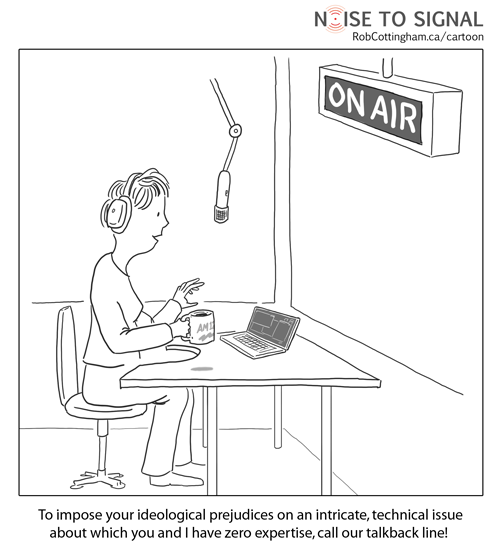Warning: bee-in-bonnet mode ON.
You know me. I’m a democratic, community-sourced, wisdom-of-crowds kinda guy. (Exhibit A: my company.)
But there’s a lot of truth in the saying “Ask a stupid question; get a stupid answer.” Just throwing out a “What do you think?” to the world probably won’t get you some high-quality feedback… especially if you’re asking about something that people haven’t thought about before, or something that requires hard-core specialized knowledge.
Yet I keep seeing that from news media: on phone-in shows, in streeters (aka person-on-the-street interviews), in opinion polls. Last week, I listened as my favourite local radio station took calls from the public over a dispute between a publicly-owned utility (disclosure: one of our clients) and a local business. At issue: whether a hook-up at the local business met safety specifications. The utility’s engineers said it didn’t; the business said it did.
And the station opened its phone lines, asking “Who’s right?”
For 99.9% of the population, the only honest answer possible is “How the hell should I know? Why are you asking me? I don’t have an engineering background.”
That, needless to say, was not the answer that came in over the phone lines. Callers divided neatly between the the-business-is-being-reckless-and-bad camp and the the-utility-is-being-bureaucratic-and-bad camp. Nobody started their contribution with “Well, I’ve examined the specs on the hookup, and compared them with utility’s technical requirements, and here’s what I’ve found…” It was all snap judgements based on worldviews and a side order of ecological fallacy.
(Actually, there was a third camp: a middle ground of people who said that no matter who’s right, insert platitude here.)
I’m not for a moment suggesting these people are stupid. But they are uninformed (as am I). And they’re being put in an impossible position: kind of a “cut the red wire or the blue wire” dilemma. Without actual knowledge to bring to bear, we fall back on arbitrary prejudice. “Well, ‘in the red’ means you’re broke, and that’s bad, while when I think ‘blue’ I’m thinking clear skies and clean water, so… snip.”
The fact is, meaningful consultation takes hard work on both sides. If you want people to give you quality input, based on their knowledge, experience, values and interests, then your conversation has to happen in a context that puts value on those factors. There’s a huge discipline and body of work on public engagement, and I can’t do justice to it in a cartoon or blog post – except to say that some producers, assignment editors and reporters don’t seem to know about it.
Maybe what we need is a movement of people willing to answer the dumb questions with the smart answer. Enough phone-ins where hosts are hearing a succession of “How the f— should I know?” responses from callers, and they might actually get the message.


